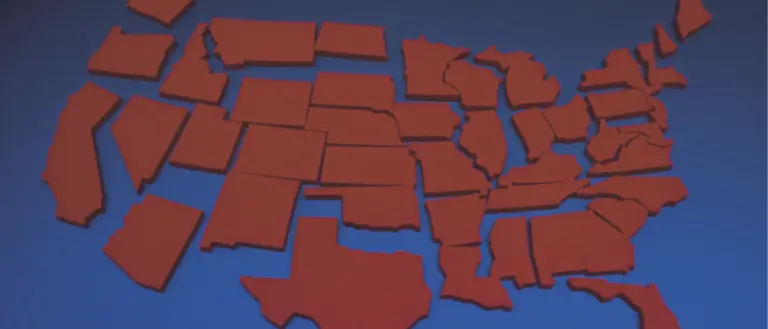Pennsylvania Sports Betting Tax Bill Points To Further Moves

A bill to reallocate sports betting revenues toward property tax relief in Pennsylvania underscores how gaming revenues could play a role in nationwide government budget shortfalls caused by the coronavirus outbreak.
Pennsylvania state Sen. Doug Mastriano submitted a proposal Thursday that directs sports betting dollars to property tax relief. Sports betting has garnered roughly $36 million in taxes this fiscal year, a proverbial drop in the bucket compared to the approximately $15 billion in statewide property taxes the commonwealth collects each year.
Still, the legislation shows the role gaming dollars could play as state legislatures look for any solution to deal with soaring unemployment and diminishing tax revenues as millions of Americans face unemployment and dwindling abilities to make ends meet.
Pennsylvania, which already has one of the most robust gaming markets in the country, will like to continue pushing gaming dollars. In other states, ratifying gaming options now legal in Pennsylvania such as online sports betting, poker and casino games, could become more pertinent, even in states that have so far resisted such moves.
Pennsylvania Tax Relief
Mastriano’s bill would move sports betting tax dollars designed for the general fund into a property tax relief fund until June 30, 2021. If passed, it would still be a small patch to a larger problem.
If passed, the sports betting revenues would be only a minor boost to property taxpayers. Property taxes are rendered separate of the overall state budget. The current tax rate is 1.35% of a property’s value, which in Pennsylvania averages to $2,223 in taxes per parcel, one of the highest tax burdens in the nation.
It also could hurt the commonwealth’s overall budget, which would lose the sports betting funds if the bill passes. Last fiscal year Pennsylvania collected $883 million more than it budgeted. Now it’s projecting a $4 billion shortfall. Future economic fallout from coronavirus could dig the financial hole even deeper.
Sports betting would only be a small piece of that picture – and that’s if there is much sports betting to begin with. Coronavirus has shuttered almost every sports league in the world. It could be months until popular American leagues such as the NHL, NBA or MLB resume their seasons.
In Pennsylvania, March sports gambling revenues fell by more than 60% from February 2020, dropping from nearly $330 million in handle to $131 million. With essentially nothing to bet on in April, next month’s revenue report will likely plummet more dramatically.
Pennsylvania is one of just a handful of states with legal real money poker and iCasino gaming, but those totals, which increased dramatically last month, are so far not enough to make up for the lost sports betting dollars.
Online gaming increased 24.5%, from $19.5 million to $24.3 million. Still, that generated just $8.6 million in taxes. Online poker revenues nearly doubled month-over-month, but the commonwealth’s lone legal poker site increased its total revenue from $1.8 million in February to $3.1 million in March.
Future in Other States
Pennsylvania shows gaming dollars won’t be a panacea for an unprecedented budget crunch. But it can be a boost. Mastriano’s bill is one way to coral gaming dollars to help struggling Americans. It won’t be the last.
Most states have either adjourned their 2020 sessions or been suspend them due to coronavirus. Most state governments allow either the governor or legislature to call itself into a special session, and many will likely due so to address the virus.
Medical preparedness for COVID-19 and economic relief will remain the legislative priority, but lawmakers will have no choice but to adjust to the new budget realities in their respective states, many of which constitutionally require a balanced budget. With record unemployment and an economy heading toward recession, politicians will have to weigh not just ways to pay for the newly unemployed but to adjust to a diminishing tax base.
They will have to do so through some combination of service cuts and new revenues. The first option will likely be necessary, but is politically unpopular. That puts even more onus on revenue generation.
Gaming Legislation Prospects
It seemed up to a dozen states would pass sports betting bills in 2020. Coronavirus closures sliced that total to four.
Virginia approved online sports betting statewide and Washington allowed in-person betting at tribal casinos. South Dakota and Maryland will allow post ballot measures this November to approve sports betting, though both will need further action by their respective legislatures in 2021 if approved by voters.
This means the remaining legislatures would have to take up sports betting again when they reconvene. This time the appeal for a new revenue source may be too much to pass up. That could include states such as Kentucky, which fought against gaming expansion earlier this year despite burgeoning political support and its deteriorating finances.
This could also push iGaming and online poker, both of which have faced stepper climbs politically in most statehouses. Though 23 states, as well as Puerto Rico and Washington D.C., have passed sports betting bills or begun taking bets since May 2018, only a handful have legalized poker or online gaming. Only Nevada, Pennsylvania, New Jersey and Delaware offer real money online poker currently, and only the later three have legal real money online casino gaming.
Even the states with legal iGaming have only a handful of operators for casino and poker (Pennsylvania has seven casino options and only one poker). Lawmakers would need to not only overcome political reservations, but create a framework for a fully rounded online casino experience. If done properly it could eclipse digital sports betting revenues, as brick-and-mortar casinos have done since their inception.
The very nature of these land-based casinos, which have been the foundation for state gambling tax dollars, could change too. Even as the nation looks to slowly lift social distancing measures in the coming weeks, it remains to be seen when casinos can open their doors. It will be even longer until they near their previous patronage. Plus, these casinos will reopen to a world with fewer patrons with the income to gamble.
As the nation begins to reconcile a post-coronavirus landscape, the future of the multi-billion dollar gambling industry, like much of society, seems to be increasingly online. It may be a while longer till elected officials embrace that trajectory, but there are growing signs they’re at the very least considering new ways to allocate – and garner – gaming tax dollars.
Ryan Butler is a legislation analyst for BettingUSA.com specializing in US sports betting legislation. Ryan breaks down the latest bills in each state to ensure our readers are up-to-date on where their states sit on sports betting. You’ll often find Ryan listening to committee hearings or preparing for the latest legislation based conference.







